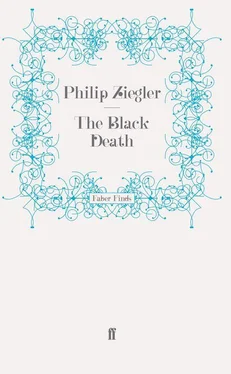This spectacle of priests haggling for extra pay and abandoning their parishioners if better pickings were to be had elsewhere was admirable material for those who were anyhow disposed to expect the worst of officers of the Church. ‘Silver is sweet’ commented Langland bitterly:
Parsons and parish priests complained to the Bishop
That their parishes were poor since the pestilence time
And asked leave and licence in London to dwell
And sing requiems for stipends, for silver is sweet:
while Chaucer put into the Reeve’s mouth the mocking words:
For Hooly chirches good moot been despended
On hooly chirches blood that is descended
Therfore he wolde his hooly blood honoure,
Though that he hooly churche sholde devoure. [6]
Some writers have also ascribed to the Black Death the responsibility for an increase in the number of pluralities among those who held benefices. {504} It would not have been surprising if the dearth of priests had led to more cases in which a single parson held two or more benefices but, though this seems to have been the result in certain continental countries, in England the ‘great increase in the practice’ to which Gasquet referred did not take place. On the contrary the evidence points, if anything, to the existence of less pluralities after the Black Death than before it. Certainly the great increase in the number of ordained priests appointed to benefices was likely to lead to a smaller proportion of non-resident parsons in the future.
* * *
The monasteries, on the whole, were still worse affected than the clergy. Including monks, nuns and friars the total population of the religious houses in England shortly before the Black Death had been something near 17,500. {505} Not far short of half these appear to have perished in the two years of the epidemic; probably more than half the friars and rather less than half the monks and nuns. In the seven monastic houses for which Snape has figures, the population dwindled by 51 per cent between 1300 and the end of the plague {506} though some of this must be attributed to declining numbers between 1300 and 1348. Numbers were never to rise again to their earlier peak. Some houses, of course, suffered far worse than others; a few were virtually obliterated, a few left almost unscathed. Recovery too was fast in some places while in others it never took place at all. At Durham, Furness and Cleeve, numbers were so reduced that the refectory and dormitory had to be cut down in size proportionately. St Albans fell from a hundred to fifty monks and found even this figure difficult to maintain over the two centuries before the dissolution. Yet two of the greatest of England’s religious leaders came to the fore at this period and new monastic colleges at Durham and Canterbury were founded shortly after it.
But the blow to the prestige and power of the monasteries did not stem only from their dwindling membership. The enormous number of chantries endowed in parish churches during and immediately after the Black Death inevitably detracted from the significance of the monasteries in the eyes of the people. {507} The high level of employment and new, exciting opportunities won away many of the more ambitious from spiritual pursuits; hitherto in the Middle Ages the Church, in one form or another, had offered to those who were not of noble birth almost the only prospect of economic or social advancement – now other possibilities were beginning to open. Many of the monks had grown accustomed to a way of life which was always comfortable and sometimes luxurious. With tithes unpaid and manorial incomes crippled, the always precarious economics of the worse-run monasteries slipped into deficit. {508} Debts quickly accumulated. More than a hundred abbots succumbed to the plague. Not only did this mean a great loss in financial acumen and expertise but also in revenue, since the Crown took over the monastic income while its leadership was vacant and exacted a heavy fine before the new appointment could be made official. {509} The economic difficulties of the monasteries do not stem entirely from the Black Death; some houses were in trouble already while others managed to survive with their affluence unaffected. But the plague was certainly the most dramatic and probably the most important element in their decline.
To lose wealth and worldly power does not, of course, automatically imply a corresponding loss of spiritual grace. It is, indeed, more commonly argued that riches of the spirit accrue in inverse ratio to riches of the world. But there is little reason to believe that the new poverty of the monks brought with it any significant access of religious fervour – on the contrary, such evidence as there is indicates that the reverse was true. Wadding’s denunciation of his own order, the Franciscans, is well known:
It was because of this misfortune [the Black Death] that the monastic Orders, in particular the mendicants, which up to this date had been flourishing, both in learning and in piety, now began to decline. Discipline became slack and faith weakened, both because of the loss of their most eminent members and the relaxation of rules which ensued as a result of these calamities. It was in vain to look to the young men who had been received without proper selection and training to bring about a reform since they thought more about filling up the empty houses than about restoring the lost sense of authority. {510}
Though the mendicant orders were included in Wadding’s strictures it seems, nevertheless, that they emerged from the plague years with heightened credit. Whether they were really more selfless and courageous than the parish clergy could hardly have been assessed by a contemporary, let alone today. The very fact that they had no territorial responsibility increased their chances of making an impression on the laity. When the parish priest performed his duty he was no more than a familiar figure doing what he had always done. The mendicant friar, descending as from heaven on a beleaguered village, was greeted with an enthusiasm which his better-established colleague rarely knew. But however this may have been, it does seem certain that their way of life precluded the display of materialism and even cupidity which was so marked among the priesthood. It was not only in England but on the mainland of Europe as well that the mendicants gained in authority and wakened the angry jealousy of their rivals.
In 1351 a counter-attack was launched. A petition, signed by a multitude of senior churchmen, was presented to Pope Clement VI, appealing for the abolition of the mendicant orders or, at least, that their members should be forbidden to preach or to hear confession. The Pope’s reply at once defended the mendicants and provided a staggering indictment of the clergy. ‘And if their preaching be stopped,’ he asked, ‘about what can you preach to the people? If on humility, you yourselves are the proudest of the world, arrogant and given to pomp. If on poverty, you are the most grasping and most covetous…. If on chastity – but we will be silent on this, for God knoweth what each man does and how many of you satisfy your lusts.’ He accused them of wasting their wealth ‘on pimps and swindlers’ and neglecting the ways of God. {511}
If there were any doubt that the Church in Europe was not generally admired or, indeed, deserving of admiration, in the years that followed the Black Death it would surely be settled by this astonishing attack delivered by a Pope on his own priests. Clement VI was himself by no means dedicated to austerity and was generally disinclined to rebuke too harshly the peccadilloes of the flesh. To have been provoked into such invective, he must have felt himself tried very far. That he was doing no more than voice the opinion of the people at large cannot be doubted; that he himself, with his superior sources of information and personal responsibility for the doings of the Church, should have endorsed that opinion is a clear verdict of guilty against the priesthood.
Читать дальше












